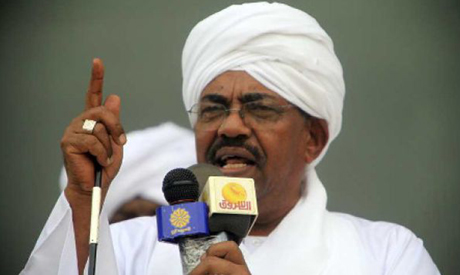
Sudanese President Omar al-Bashir speaks during a rally to support Darfur peace talks in Khartoum August 7, 2010. (Photo: Reuters)
Sudanese security forces are using live ammunition and increasingly aggressive tactics against unprecedented anti-government demonstrations sparked by inflation, a senior opposition figure alleged on Wednesday.
Mariam al-Mahdi, the daughter of former prime minister Sadiq al-Mahdi, said the Wad Nubawi mosque, linked to her Umma Party, has been the scene of worsening attacks by government forces against peaceful protesters gathered on Fridays.
"Each time, the brutality, the aggressiveness, has been... increasing," said Mahdi, a member of the politbureau in the party led by her father, speaking in an interview with AFP.
Authorities began to use gas and rubber bullets on June 22 when small demonstrations broke out after Friday prayers at the mosque, and elsewhere in the city, but things got worse the following week, she said.
"People were besieged inside the mosque," as police and agents of the National Intelligence and Security Service attacked "at the time of prayers," said Mahdi, who witnessed the events.
The protesters were, however, able to set up a first-aid area for those affected by gas or struck by the rubber bullets, as two female university students were, she said.
"They used live ammunition," mostly firing in the air in an effort to disperse people, but a security agent deliberately wounded one person in the leg, she alleged.
Last Friday, when hundreds of party members and others again held a sit-in at the mosque, which has become a focus for the demonstrators, the security cordon tightened and there was no way to provide first aid to the injured, Mahdi said.
"They deliberately concentrated on isolating the people who were sitting in, from any help," she said, adding that "sound bombs" were used as well as gas.
"We had many hit with rubber bullets. Again one hit with live ammunition," she said.
"So it seems it is very much escalating," Mahdi said. "It's shameless brutality. It's the shameless attack on mosques."
Protests in Sudan began on June 16, when University of Khartoum students first voiced their opposition to high food prices.
After President Omar al-Bashir announced austerity measures, including tax hikes and an end to cheap fuel, protests spread to include a cross-section of people around the capital and in other parts of Sudan.
Now in their fourth week, the scattered demonstrations are the longest-running challenge to the regime of Bashir, who seized power in 1989 from democratically-elected Sadiq al-Mahdi.
The European Union, Canada, the United Nations, Britain and the United States have expressed concern over Khartoum's response to the protests.
In late June police said they were responding "with a minimum use of force" against the demonstrators, whom the government calls "rioters" posing a threat to Sudan's stability.
Bashir has played down the demonstrations as small-scale and not comparable to the Arab Spring uprisings in Egypt and elsewhere, maintaining that he himself remains popular after 23 years in power.
Mariam al-Mahdi said she did not know what will happen at the Wad Nubawi mosque this Friday but the government's attitude is hardening.
"They have been saying in the media, in the radio, they will not allow any mosques to be used for... foreign conspiracies and they will close any mosque which allows itself to be a forum for such activities," she said.
Short link: